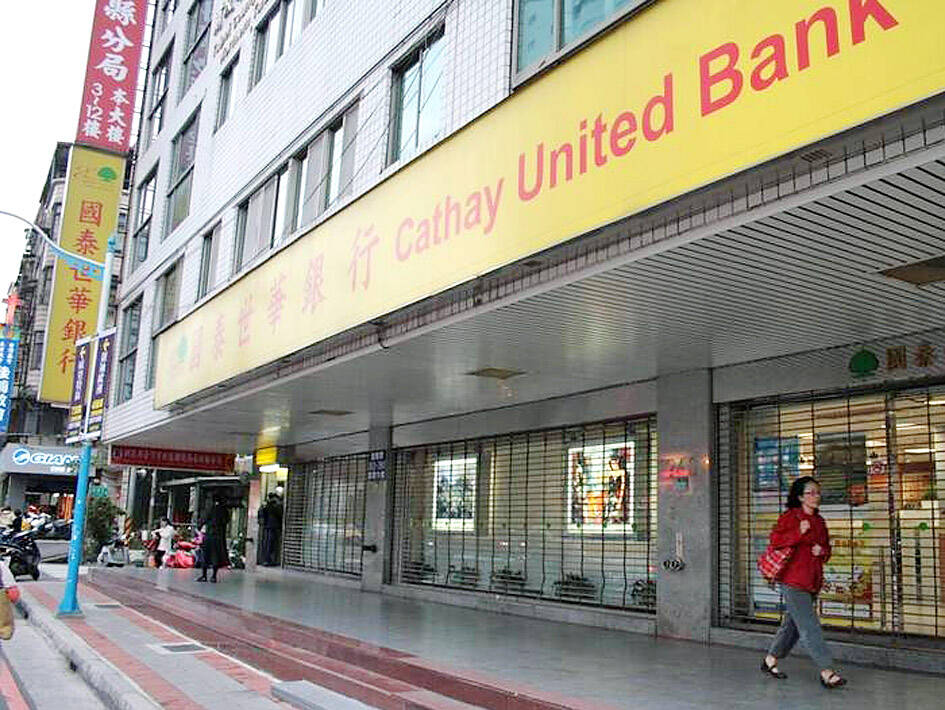Cathay Financial Holding Co (國泰金控), Taiwan’s largest financial firm by assets, is hiring more staff in Singapore to follow shifting regional money flows as its clients expand their presence in Southeast Asia.
The group’s Cathay United Bank Co (國泰世華銀行) is ramping up headcount in the city-state to about 200 by next year, from 100 two years ago, said Winfield Wong (黃偉坤), chief executive officer of the bank’s Singapore unit.
Recent additions include relationship managers for corporate clients that are expanding in the region, as well as private bankers, he said.

Photo: Taipei Times file photo
The growth plan underscores how Singapore and its neighbors are benefiting as US-China tensions prompt companies to diversify investments and manufacturing throughout Southeast Asia.
“There’s huge outbound investment flows as a result of supply-chain diversification,” Wong said in an interview.
Taiwan’s Vanguard International Semiconductor Corp (世界先進) and NXP Semiconductors NV are teaming up to build a US$7.8 billion semiconductor fab in Singapore, the companies announced early this month.
Hon Hai Precision Industry Co (鴻海精密), a major supplier to Apple Inc, is among firms adding plants in Vietnam.
This year, the Taiwanese bank is looking to add more staff in information technology, risk, transaction management and capital solutions, Wong said.
Cathay United Bank operates in nine Southeast Asian markets. The lender’s private-bank assets under management in Singapore doubled to several hundred million dollars since the business started there in 2020, Wong said.
The minimum threshold for an account is about US$2 million.
Wong is among the recent hires. The Singaporean joined Cathay in February last year, after more than 12 years at HSBC Holdings PLC, where he rotated around Hong Kong, Vietnam and the city-state. He has also worked at Citigroup Inc and ANZ Group Holdings Ltd.
China was once the top destination for Taiwanese investors and accounted for 84 percent of Taiwan’s foreign direct investment at its peak in 2010. That dropped last year to 11 percent, and lagged behind a group including India, Australia and Southeast Asia for the second year in a row.
The Taiwanese banking sector’s total exposure to China has contracted for 12 consecutive quarters and reached its lowest level in the first three months this year, data from the Financial Supervisory Commission showed.

When an apartment comes up for rent in Germany’s big cities, hundreds of prospective tenants often queue down the street to view it, but the acute shortage of affordable housing is getting scant attention ahead of today’s snap general election. “Housing is one of the main problems for people, but nobody talks about it, nobody takes it seriously,” said Andreas Ibel, president of Build Europe, an association representing housing developers. Migration and the sluggish economy top the list of voters’ concerns, but analysts say housing policy fails to break through as returns on investment take time to register, making the

NOT TO WORRY: Some people are concerned funds might continue moving out of the country, but the central bank said financial account outflows are not unusual in Taiwan Taiwan’s outbound investments hit a new high last year due to investments made by contract chipmaker Taiwan Semiconductor Manufacturing Co (TSMC, 台積電) and other major manufacturers to boost global expansion, the central bank said on Thursday. The net increase in outbound investments last year reached a record US$21.05 billion, while the net increase in outbound investments by Taiwanese residents reached a record US$31.98 billion, central bank data showed. Chen Fei-wen (陳斐紋), deputy director of the central bank’s Department of Economic Research, said the increase was largely due to TSMC’s efforts to expand production in the US and Japan. Investments by Vanguard International

WARNING SHOT: The US president has threatened to impose 25 percent tariffs on all imported vehicles, and similar or higher duties on pharmaceuticals and semiconductors US President Donald Trump on Wednesday suggested that a trade deal with China was “possible” — a key target in the US leader’s tariffs policy. The US in 2020 had already agreed to “a great trade deal with China” and a new deal was “possible,” Trump said. Trump said he expected Chinese President Xi Jinping (習近平) to visit the US, without giving a timeline for his trip. Trump also said that he was talking to China about TikTok, as the US seeks to broker a sale of the popular app owned by Chinese firm ByteDance Ltd (字節跳動). Trump last week said that he had

STRUGGLING TO SURVIVE: The group is proposing a consortium of investors, with Tesla as the largest backer, and possibly a minority investment by Hon Hai Precision Nissan Motor Co shares jumped after the Financial Times reported that a high-level Japanese group has drawn up plans to seek investment from Elon Musk’s Tesla Inc to aid the struggling automaker. The group believes the electric vehicle (EV) maker is interested in acquiring Nissan’s plants in the US, the newspaper reported, citing people it did not identify. The proposal envisions a consortium of investors, with Tesla as the largest backer, but also includes the possibility of a minority investment by Hon Hai Precision Industry Co (鴻海精密) to prevent a full takeover by the Apple supplier, the report said. The group is